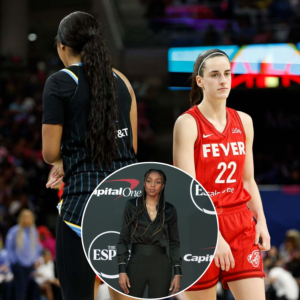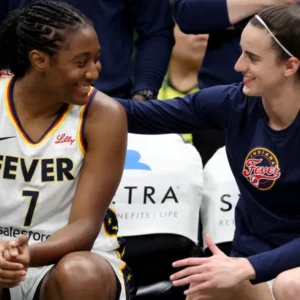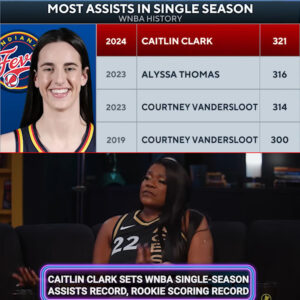Some have debated whether Caitlin Clark and Angel Reese would immediately dominate upon entering the WNBA. Cheryl Swoopes, a legendary player, expressed doubts, saying, “I didn’t think Caitlin or Angel would come into the league and dominate immediately, and I still don’t think she’s dominating.” Many critics have echoed similar sentiments, but the statistics show a different story for Clark, who has silenced many of her detractors.
Clark’s rookie season has exceeded the expectations of fans and doubters alike. She is currently averaging 19.5 points, 8.4 assists, and 5.7 rebounds per game—numbers that rank her among the top 10 in the entire league. Clark leads the league in assists and points generated, while also ranking first in three-pointers made and fourth in fourth-quarter points per game. By any measure, these are dominant numbers, not just for a rookie, but for any WNBA player, including All-Stars and superstars.
Swoopes, however, has been steadfast in her criticism, stating that Clark is not dominating. To her, dominance is more aligned with what Clark did in college, where she routinely averaged 30+ points per game. Swoopes’ comments seem to shift the goalposts, making it difficult to reconcile her standards with what Clark has accomplished. Post-All-Star break, Clark has been even more impressive, averaging 24.7 points, 8.9 assists, and 5.5 rebounds while shooting nearly 60% in true shooting percentage. During this time, she has recorded multiple double-doubles, a triple-double, and a 35-point game—surpassing Swoopes’ career-high of 34 points.
Clark’s numbers post-All-Star break rank her third in points per game, first in assists, and first in three-pointers made. Despite this, Swoopes continues to claim that Clark isn’t dominating, leading many to question her definition of the term. If Clark’s performance isn’t considered dominance, then by this logic, even an MVP like A’ja Wilson wouldn’t qualify as dominant.
Comparing college stats to pro stats is a flawed approach, as demonstrated by players like Larry Bird, whose college averages dwarfed his NBA numbers, yet Bird was undeniably dominant from the start of his pro career. Similarly, Clark has adjusted her game for the WNBA, but she’s still leading her team and the league in key categories.
Critics like Swoopes and Gilbert Arenas argue that dominance should be measured against a player’s future potential, rather than their performance relative to the rest of the league. But even by this subjective standard, Clark is a dominant player in her rookie season, much like Michael Jordan was when he first entered the NBA.
In the WNBA, dominant guards like Sabrina Ionescu, Jewell Loyd, and Kelsey Plum have been surpassed by Clark’s production. To suggest that players like Riquna Williams or Arike Ogunbowale are dominant but Clark is not ignores the statistical reality.
Swoopes’ argument that Clark isn’t dominating seems to hinge on an arbitrary definition of the term. If dominance means leading the league in key categories, consistently outperforming expectations, and carrying a team, then Caitlin Clark has undoubtedly had a dominant rookie season.
News
Former WNBA All-Star Facing Intense Backlash Over Caitlin Clark-Angel Reese Accusation (PO)
Two-time WNBA All-Star Renee Montgomery has found herself in hot water of late. This is after the Atlanta Dream co-owner and vice president went on an unfiltered tirade on her podcast…
Kelsey Mitchell Has One Wish After Revealing Caitlin Clark ‘Reality’ (PO)
Kelsey Mitchell has been with the Indiana Fever for the past seven seasons. However, it’s only recently that she’s emerged as a bit of a household name, especially for…
WNBA Team Owner Hits Caitlin Clark Fans With Serious Accusation (PO)
Renee Montgomery is a former WNBA All-Star who won the Sixth Woman of the Year award in 2012. The 5-foot-7 guard has two championships to her name and transitioned…
HOT: VHONG NAVARRO, GANDA, ANNE CURTIS, & THE ‘IT’S SHOWTIME’ FAMILY fear Kim Chiu now faces complaints at MTRCB over new comments (ht)
It’s Showtime host Kim Chiu is now facing complaints before the Movie Television Review and Classification Board (MTRCB) over the remarks she made during one of the…
Justin Bieber, the singer who hates his fans (NG)
Snubs, insults, aggression and even spitting. The Canadian seems to have an increasingly worse relationship with his fans. Now he has caused trouble again in Australia. They…
“Sheryl Swoopes would be no one” – Analyst fires shots at 4x champ & Monica McNutt, highlighting Caitlin Clark’s impact on WNBA (PO)
Since the arrival of Caitlin Clark, the WNBA has experienced a surge in popularity. However, aside from attracting more fans to the women’s professional league, she has…
End of content
No more pages to load
Relative Articles
None found






